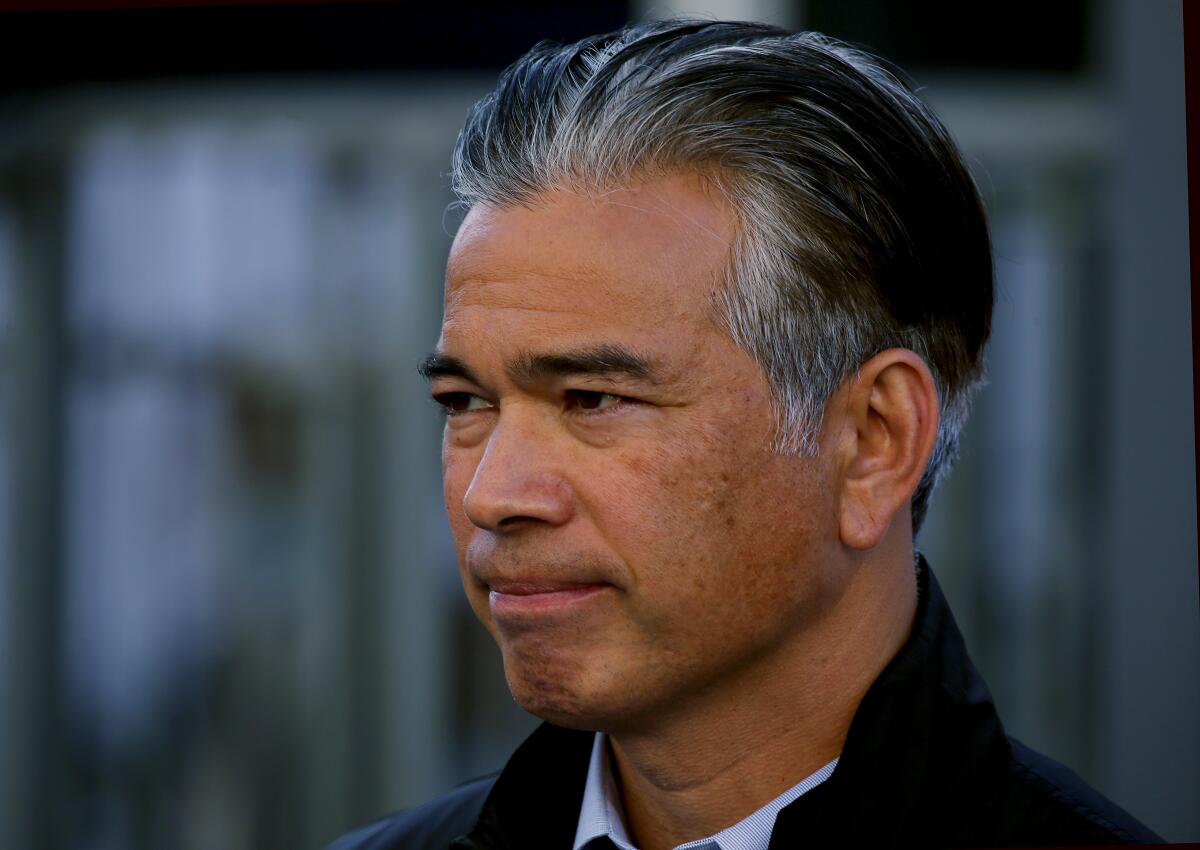Fontana settles with California AG over alleged environmental violations

- Share via
Nine months after California Atty. Gen. Rob Bonta sued the city of Fontana for allegedly flouting a state-mandated environmental review process when it approved the construction of a trucking warehouse next to a high school, city officials have enacted new regulations intended to rein in air pollution from logistic centers as a part of a legal settlement.
Bonta announced Monday that his office had resolved its legal dispute with the city of Fontana, which was accused of violating the California Environmental Quality Act. The action comes after city officials last week passed an ordinance outlining a litany of new requirements for future warehouse projects.
The new regulations require that developers establish buffer zone at least 10 feet wide around all warehouse projects greater than 50,000 square feet. Drought-tolerant trees must also be planted and maintained within the buffer zone.
Also, any new warehouse developments larger than 400,000 square feet must be powered by solar energy exclusively — except activities where refrigeration is required. All on-site equipment, such as forklifts, must be zero emission, while loading docks must be located at least 300 feet away from sensitive sites such as homes, schools, day-care centers or hospitals.
“On a given day, you might see long queues of trucks stopped, their engines idle, spewing toxic fumes into the air as they wait to access loading bays at the five dozen or so warehouses in this single city,” Bonta said. “For too long warehouse development in Fontana went unchecked and the city’s most vulnerable communities paid the price of dirty air and traffic and noise associated with the 24-hour warehouse operations.”
Bonta’s lawsuit, filed in July, stemmed from the Fontana City Council’s approval of a 205,000-square-foot warehouse on 8.68 acres of land adjoining Jurupa Hills High School, which is in a working-class, Latino community that, at the time, suffered some of the worst air quality in the state.
The school, which has an enrollment of about 2,000 students, is on Fontana’s south side — a part of town that has seen tremendous growth in warehouse developments. At the time the suit was filed, more than 20 warehouses had been built within a mile of the school. Most have been built within the last 10 years, according to court documents.
At public meetings, residents expressed concerns over the health effects of fine particles in vehicle exhaust, which can travel deep inside a person’s lungs. This type of pollution has been linked with asthma and heart disease.
“Many parents have shared their concerns with the increase of nosebleeds or the increase of asthma rates,” said Liz Sena, co-founder of South Fontana Concerned Citizens Coalition. “Not to mention some of our community was impacted by COVID, which will now have long-lasting effects on their respiratory [system].”
Still, the city approved plans from developer Duke Realty Corp. for a warehouse with 22 truck docks, 40 truck parking stalls and 95 standard parking stalls. The warehouse, which would operate around the clock, was expected to witness more than 110 daily truck trips and 272 daily passenger car trips.
Bonta’s office argued that Fontana violated the California Environmental Quality Act in approving Duke Realty’s plan, because it didn’t consider the burden of air quality issues from existing warehouse traffic.
Fontana officials, who described the new ordinance as “one of the most environmentally stringent in California,” said the new stipulations will ensure that all industrial development within the city exceeds all federal and state environmental standards for warehouses and freight operations.
“We are in agreement with Attorney General Bonta — this ordinance should serve as a model for other local governments across the State. We are proud to be leading the way once again,” Fontana Mayor Acquanetta Warren said in a statement Monday.
Sena, the South Fontana community leader, has countered the notion that this is a proactive effort by the city. Before the attorney general’s office intervened, she raised $315 to file a formal appeal of the Duke Realty warehouse project, which the city voted to deny.
“Of course, they have to defend their reputation and make it seem like like it was their idea to create the ordinance, when, in the reality, they were forced into that ordinance with the lawsuit,” Sena said.
The ordinance will focus only on larger warehouse developments, which have become the norm regionally and nationally. According to the commercial real estate and investment firm CBRE Group, the average size of a warehouse development in the Inland Empire, between 2002 and 2007, was about 105,000 square feet. Between 2012 and 2017, it was around 305,000 square feet.
Much of the ordinance lays out requirements for facilities larger than 400,000 square feet and won’t pertain to the warehouse located next to Jurupa Hills High School.
Under the settlement, developer Duke Realty will have to dedicate $210,000, which will go toward planting a landscaped buffer on school grounds and providing a five-year supply of air filters to up to 1,750 households nearby.
For community members, like Sena, it’s not a perfect compromise, but it’s a start.
“This is a step in the right direction,” Sena said, “but we have plenty of miles to walk.”
More to Read
Sign up for Essential California
The most important California stories and recommendations in your inbox every morning.
You may occasionally receive promotional content from the Los Angeles Times.














